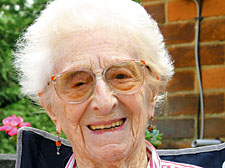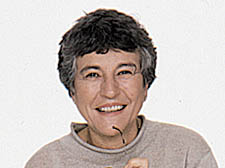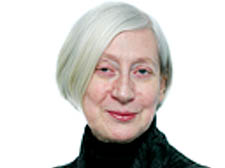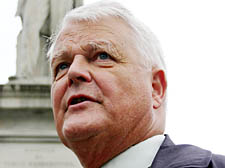|
|
 |
| |

Rose Hacker, went on working beyond 100 because she was having such fun |

Witty woman who just happened to be old
WRITER and broadcaster Irma Kurtz writes: I considered it a privilege to interview Rose Hacker not long ago for a book I am writing about growing old.
I hoped our encounter would be enlightening; I imagined it would teach me a lot about the process of ageing; what I never expected, not in 100 years, is that meeting Rose Hacker would be an absolute delight.
Meeting Rose 18 months into what she called her “second century” was fun. Within moments her great age ceased to be the most impressive or important thing about an intelligent, witty and communicative woman who just happened to be very old.
She talked about art, for many of her acquaintances were artists. Among her many gifts and vocations, she was an accomplished sculptress.
She talked about politics too, a little ruefully: “Sometimes I am afraid of what is happening politically.”
Rose, the dedicated lifetime socialist, said: “Politics was a voluntary thing, a calling to make a better world. It was a Greek ideal”, and then, as senescent kvetching was not Rose’s way, she said mischievously: “Of course, the Greeks had slaves…”
I have but a single regret about meeting Rose: I am sorry I did not follow up our first meeting immediately with another and many more.
I thought there would be time to celebrate our new friendship when I finished the book. Alas, time disagreed. I met Rose only once; I will miss her always. |

A radical socialist – not many around now
DAME Denise Platt writes: I met Rose when we shared a platform before Christmas. We were there to talk about what care should look like for people when they get older.
Paradoxically, she spoke in the most dignified way about the indignity of old age, and what it was like to be 101. I’ll always remember what she told me afterwards: “Denise, I am not a tick box. I am more than a tick box, I am person.”
She was an absolutely amazing woman. She described herself as a radical socialist – not many of them around now. From her care home, about which she spoke very highly, she lived life to the full, right to the end.
• Dame Denise Platt dedicated a speech about the State of Social Care Report, made at the House of Commons on Tuesday, to Rose Hacker.
|

Vision of humanity
CND vice-president Bruce Kent would meet Rose Hacker in Tavistock Square, Bloomsbury, on Hiroshima Day – the memorial event marking the atom bomb attack on the Japanese city.
He said: “Rose was an outstanding person who wrote lucidly and intelligently right up to the end. She had a wide vision of humanity, peace and justice. I read her articles with astonishment. They were so well put together and clearly thought out.” |
Rose, to the end a light burning brightly
New Journal columnist, the world’s oldest, leaves as her legacy the example of a life spent in pursuit of challenges
ROSE Hacker, the New Journal columnist billed as the world’s oldest, died this week, just short of her 102nd birthday.
In the 1930s, she was involved in the fight against fascism and worked to ease the plight of the working class during the Depression.
She worked as a marriage guidance counsellor in the 1950s and in the 1970s served on the Greater London Council and then became president of the Progressive League.
As well as writing a regular column for the New Journal – her final one appeared last week – she was an accomplished sculptor and took up tai chi, the Chinese keep-fit regime, in her 80s.
Below, a friend of almost 50 years, Bernard MILLER, and others who knew Rose pay tribute to her indomitable spirit.
FEW people start a totally new career at the age of 100. Rose Hacker did just that, gaining local, national and international acclaim as a political columnist with this newspaper.
She was born in central London to Jewish immigrant parents. Her father was a successful manufacturer of women’s clothes, but little in her middle-class childhood suggested she would become a lifelong campaigner for the rights of the poor and underprivileged.
Yet by her teens, watching the wounded returning from World War I, she had already become a committed pacifist. Rose worked ceaselessly for peace and disarmament right up to her last days.
Before the age of 20, the shocking sight of hunger marchers in Oxford Street led her to an unwavering commitment to socialism.
Rose often described herself, sometimes wistfully, as having been lazy at school and having no formal education, although she did study art, design and commercial French and German at Regent Street Polytechnic. She made up for this lack by an insatiable appetite for learning in almost every field, becoming a successful author, artist, politician, social worker, councillor, counsellor and, most recently, columnist.
Until her long and successful marriage to Mark Hacker, a young accountant, she worked for her father as a clothes designer, model and business assistant, enjoying a full social life in the flapper era.
She often described her outrage at the economic and social pressures which prevented her from marrying her first love, a young doctor, who was forced to choose between marriage and career.
However, the match with Mark Hacker could not have been better. Their lives complemented each other. Mark provided the quiet, serious and solid support that made it possible for this glamorous redhead, with her socially radical ideas and ideals, to achieve her objectives of helping people and making the world a better place. He also offered her a refuge from her public life, a moral anchor and an example of business rectitude.
The Labour Party, born in the same year as Rose, provided a political framework for many of her efforts although she bemoaned the fact that the addition of “New” to its name marked a departure from socialist and, more importantly, caring policies.
Social work, in many different areas, offered arenas for her to put her ideals into practice. The birth of her two sons, Lawrence and Michael, brought the new challenge of trying to turn her beliefs on child-rearing and education into personal reality. At around this time her involvement with the Co-operative Correspondence Club widened her horizons and deepened her determination to work for social change.
Through work in the Marriage Guidance Council, she developed a greater involvement in counselling, education and working to overcome disadvantage. This led to work in prisons, mental hospitals and with the disabled.
Her books about sex education, Telling the Teenagers and The Opposite Sex, became best-sellers and her relationship counselling led to her being dubbed Britain’s first sex therapist, a description that made her laugh. She always corrected it to “relationship counsellor”.
Appointments to various voluntary and local government bodies involved with education, housing, senior and disabled care and mental health, led eventually to her accepting the challenge of elected public office as a member of the Greater London Council for St Pancras at 67.
She served as chairwoman of the Thames and Other Waterways Board, a task she adored.
Rose’s determination to write a newspaper column as a centenarian had a simple objective. She wanted her great-grandchildren to know that right up to the end she had fought to leave a better world for them than the one she felt politicians and financial interests were creating.
Among Rose’s remarkable attributes were her phenomenal memory. She took experiences from almost every year of her life – and sometimes from centuries before – and linked them to events happening in that day’s news. She could quote poetry, opera, drama, lectures she had attended 60 or 70 years ago, books she had read or current news.
Her razor-sharp mind and wit were used to great effect. During her last illness, get-well cards from readers showed that people felt she was speaking for them.
Because her column was a personal one, she felt no need to ensure political balance, only to tell the truth as she saw it. During a recent meeting with New Journal editor Eric Gordon, she was a little disappointed to discover nobody was writing in to complain.
If we had both survived until 2009, it would have made 50 years since I first knew Rose. Then I thought of her as “that old lady across the road”. Now I think of her as a contemporary.
When she said she wanted to write a column but her eyesight was not good enough, I foolishly offered to “help”. If anyone had told me just how much work she was going to give me in order to produce columns of the highest standard, I might have thought twice, but working with Rose there was hardly time to think even once.
For nearly 18 months her life was a frantic whirl of writing, public speaking engagements, and attending events for organisations she believed in. She was interviewed by national newspapers, featured in magazine articles, appeared on radio and television and was constantly being asked to take on new challenges, most of which she accepted with alacrity.
Less than a year ago, Rose made her stage dance debut at The Place, in Euston, in a dance choreographed specially for her and two fellow residents of the Mary Fielding Trust, the wonderful home in Highgate where she lived and whose caring staff she was convinced made it possible for her to continue enjoying life.
She wrote recently about the indignities of a physically deteriorating old age but concluded that she was prepared to continue working as long as she could because she was having such fun. Then, two weeks ago, she suffered a stroke and most fun stopped. She was still delighted by visitors, family and friends, by music and by the cards, articles and book extracts read to her, as well as the cards that poured in from readers and other fans.
Her adopted daughter in America sent daily poems which brought her great pleasure.
She died surrounded by her immediate family, reading to her and playing some of her favourite music. She would not have asked for more.
Rose leaves a legacy too long and detailed to list here but perhaps the most important part of that heritage is the example she set. She showed that irrespective of age and health, if people really care enough they can take on new challenges and succeed.
Rose would be thrilled if she thought others could take over where she left off and do even better.
• The funeral will be held on Monday at 2pm at Golders Green crematorium.
– See John Gulliver |
 |
|
|
 |
|
 |
|










